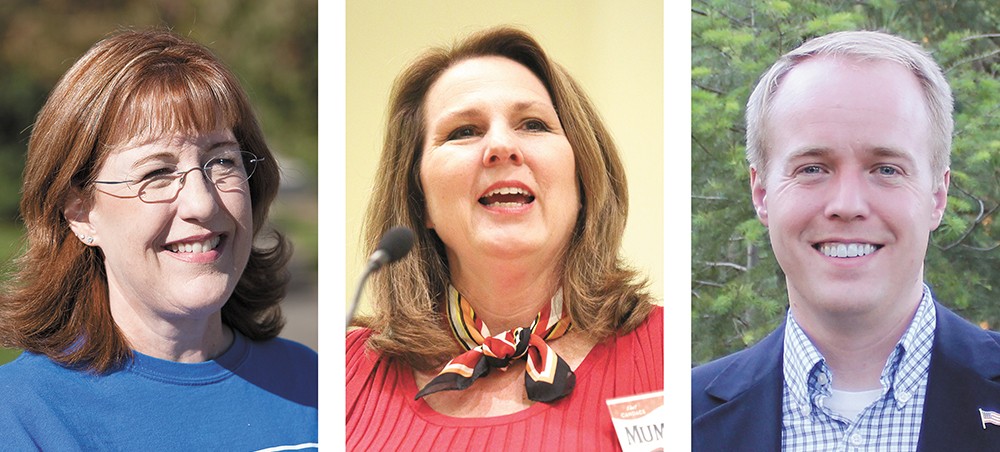
In February, Nancy McLaughlin walked up in front of Spokane GOP precinct officers holding a Bible, a copy of the U.S. Constitution and dolls of a baby and horse. On this day, her conservative values would not be questioned.
She said the Bible was her "foundation" that informs her belief in "God's design for marriage" between a man and woman. She called the U.S. Constitution "the best political document ever." The baby represented her pro-life stance on abortion. The horse was a symbol of her fight for "liberties we hold near and dear," in what she considers a war being waged against the country and the constitution.
"I'm asking you to put me No. 1 on your list and send me back to battle," said McLaughlin, a former Spokane city councilwoman. "Send me back to fight for low taxes and limited government."
It worked. The Spokane County Republican Party chose McLaughlin to fill the seat vacated by Todd Mielke on the Spokane County Board of Commissioners. Commissioners Al French and Shelly O'Quinn confirmed that choice.
But Josh Kerns, who is trying to unseat McLaughlin, says he's not convinced she has always displayed conservative values in her eight years on the Spokane City Council and five months on the county commission. Kerns is trying to position himself to the right of McLaughlin, arguing that he, not McLaughlin, is the conservative candidate who will never raise taxes, who will limit government and who will attract business to Spokane County.
Another challenger, Candace Mumm, a Democrat and current Spokane city councilwoman, is running for McLaughlin's seat in part because she says people are tired of the county and city fighting. Mumm describes herself as financially conservative and says she could facilitate cooperation between the city and county, two entities that have been at odds on issues concerning land and economic growth.
McLaughlin casts herself as the pragmatic and more experienced conservative choice. Kerns, in his first time running for office, brims with ideas and touts his experience in Olympia as a legislative aide. Mumm thinks her combination of work locally and regionally gives her the experience needed to serve the county and add a fresh perspective to the commission.
Voters in District 1, northern Spokane County, will send two of these candidates past the Aug. 2 primary and on to the general election in November.
BUSINESS & TAXES
In her first few months on the job, McLaughlin says one thing has become clear: The county needs to grow its tax base.
"In spite of the recovery of the economy, we still have a structural gap where our expenses are outpacing our revenues by a good couple of percentage points," she says.
The solution, she says, besides finding cost-saving measures internally, is attracting businesses and encouraging young entrepreneurs to stay, thereby increasing tax revenue — not to increase tax rates, she says.
That, in practice, means getting new businesses through permit processes as quickly as possible and helping them get up and running.
Kerns has similar ideas. He stresses the importance of keeping graduates from local universities, saying a "huge portion" of people graduating from college in the area leave because they can't find employment here.
Mumm, twice elected president of the city's Plan Commission, says she is a business-friendly candidate as well. Supporting small businesses in Spokane, she says, is "the best thing we can do" because they are more likely to stay in Spokane and invest in the community.
"I have a lot of experience with projects that bring both government and private business together," Mumm says.
But Kerns says the ordinance that the city council passed this year to mandate paid sick leave — voted for by Mumm — is not fiscally responsible.
"We need to be focused on creating an environment that is conducive to more people finding jobs, more people being employed," Kerns says.
Kerns has also criticized McLaughlin for supporting some tax increases in her time on the city council. He points out that she proposed the creation of the Salary Review Commission, which then raised councilmember salaries from $18,000 to $30,000. She also supported an initiative increasing taxes to keep libraries open. That initiative easily passed.
McLaughlin stands by those decisions. Raising the councilmember salaries attracts better candidates and is something "common-sense, smart conservatives understand," she says. She called Kerns' statements "naive" and "disingenuous."
"The things I have supported that people say raised taxes are the things that we all together as citizens agreed that we wanted to spend our money on," she says.
Kerns also criticizes McLaughlin for her silence on a proposed Spokane Transit Authority sales-tax increase of up to 0.2 percent for projects that include the Central City Line, a bus route from downtown to Spokane Community College. Kerns is against the Central City Line. Although he gets the desire for an "iconic route," he doesn't see the need for an "iconic vehicle" like an electric bus to run on it.
Mumm, who sits on the STA board, says she will vote for the sales tax increase. McLaughlin, however, says she has weighed the pros and cons and hasn't made up her mind.
WHERE TO GROW FROM HERE
In 2013, Spokane County commissioners expanded the size of the county's Urban Growth Area. The UGA determines where services such as sewer, water and transportation must be provided by municipalities in anticipation of denser development.
The UGA is at the center of a debate on how the region should grow. Should it spread out and invite economic growth on the edges of the county? Or should it build up from the inside, preventing a sprawling suburbia and potentially strengthening the city's core?
Earlier this year, Spokane County commissioners signed an agreement, in response to lawsuits with neighborhood associations, locking in the current urban growth boundary until 2025 and agreeing to accept lower population growth forecasts that could limit further expansion.
Mumm is on the county's Growth Management Steering Committee of Elected Officials, and she's firmly of the belief that the county should be building inside the UGA and not expanding it "beyond our means." The city's stance on restricting growth on the outskirts in recent years has caused conflict with the county. Mumm, however, says she's not against growth, but for smart, affordable growth.
Kerns thinks the county made the wrong move in agreeing not to expand the UGA. He worries that it will cause housing prices to increase because the county can't open up more land for development.
McLaughlin says "in any mediation settlement, probably, nobody is perfectly happy with an outcome." She says the agreement stops the bleeding in litigation costs, and says it allows for some predictability for the future. McLaughlin would like to see the county re-evaluate how it determines what land is developable.
"We have to take another look at what we want our community to look like," she says.♦























